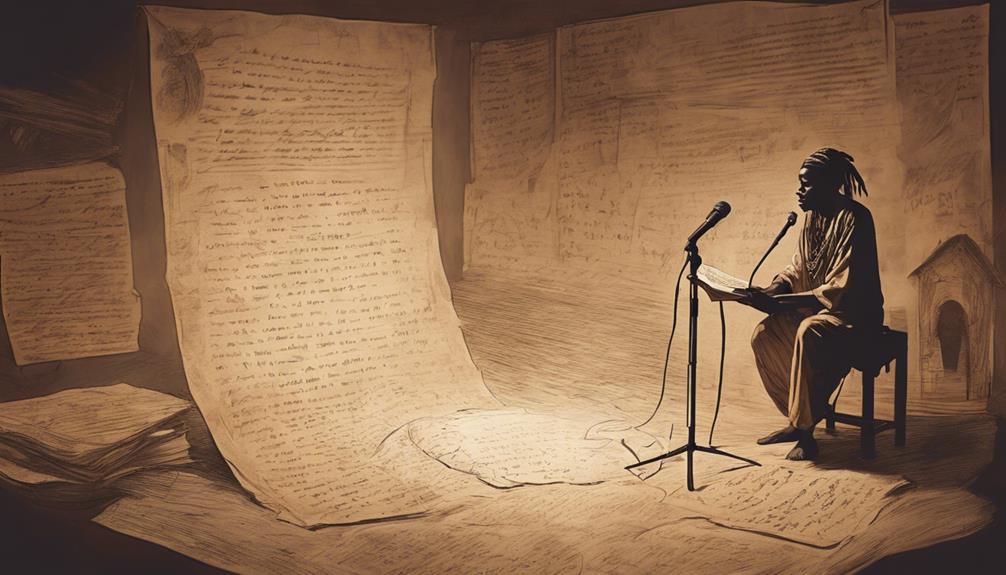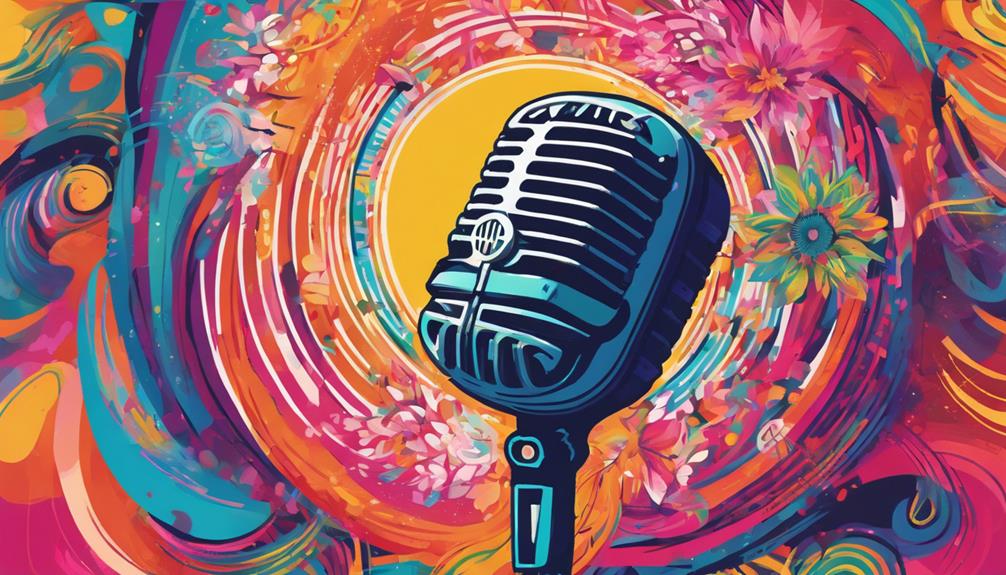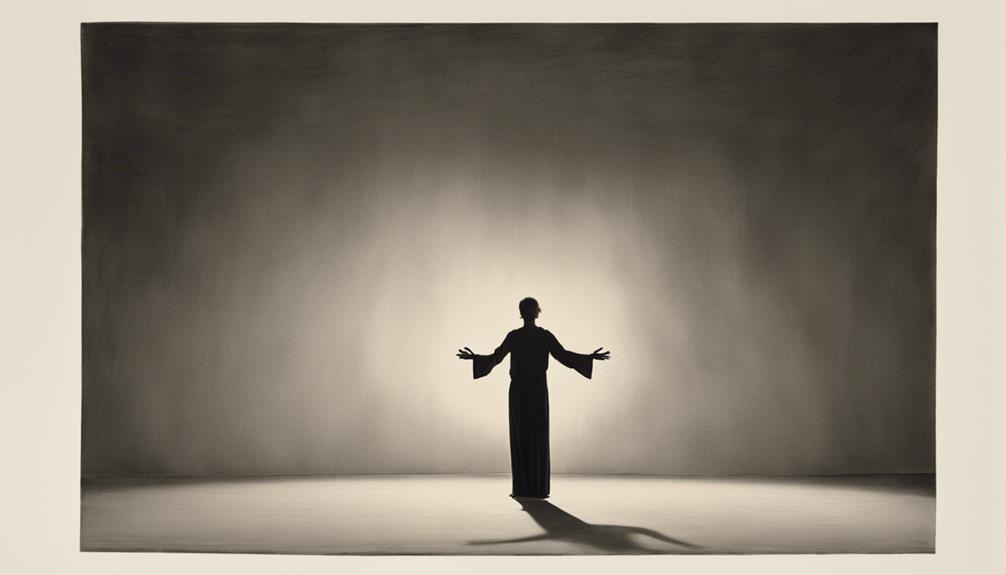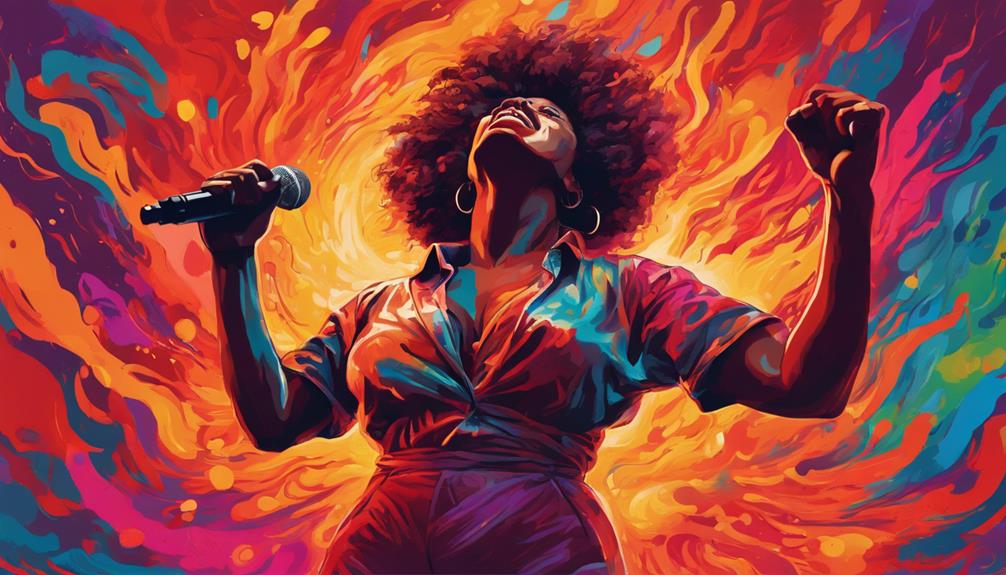As you step into the domain of performance and spoken word, you enter a dynamic interplay of voice, body, and audience, where ancient traditions of oral storytelling converge with modern expressions of empowerment and social change. Your voice becomes an instrument, weaving a sonic tapestry with every inflection and gesture. Your body serves as a canvas, conveying emotion through deliberate postures and facial cues. You'll discover how to craft unforgettable Mic Drop Moments, and how unapologetic voices rise to challenge the status quo. As you navigate this intersection of performance and spoken word, you'll uncover the secrets to unlocking your full expressive potential, and more.
The Evolution of Oral Tradition

As you explore the world of performance and spoken word, it's essential to recognize that the origins of oral tradition extend far beyond the modern era, with ancient civilizations relying heavily on the spoken word to convey cultural values, myths, and legends. This rich cultural heritage is rooted in communal sharing, where stories were passed down through generations, fostering a sense of community and shared identity. The oral tradition played an important role in preserving cultural roots, allowing ancient societies to transmit their history, beliefs, and values to future generations. Through the spoken word, ancient cultures could convey complex ideas, myths, and legends, which were often accompanied by gestures, tone, and pitch, adding depth and emotion to the narrative. This emphasis on communal sharing and cultural roots highlights the significance of oral tradition in shaping the fabric of ancient societies, and its continued influence on modern performance and spoken word practices. By acknowledging the evolution of oral tradition, you can better appreciate the complexities and nuances of contemporary performance and spoken word art forms.
Voice as Instrument

In the domain of performance and spoken word, your voice becomes a dynamic instrument, capable of conveying emotion, tone, and meaning through subtle variations in pitch, volume, and cadence. As you navigate the sonic landscape of your performance, you wield your voice like a maestro, expertly modulating tone and timbre to evoke specific emotional responses from your audience. Vocal inflections become an essential tool in your arsenal, allowing you to convey nuance and complexity through subtle shifts in tone and pitch. By masterfully manipulating your voice, you create a rich tapestry of sound, weaving together disparate elements to craft a unique sonic landscape that draws your audience in and refuses to let go. As you experiment with the expressive possibilities of your voice, you begin to harness the full potential of spoken word, transforming your performance into a truly immersive experience.
Body Language of Emotion

Your body becomes a canvas of emotional expression, conveying subtle shades of feeling through deliberate postures, gestures, and facial cues that reinforce or subvert the emotional tone of your spoken words. As a performer, you're not just reciting words, you're crafting an embodied experience that resonates with your audience. Your facial cues, in particular, are vital in conveying emotional authenticity. A subtle smirk or a raised eyebrow can completely flip the emotional tone of a line, adding layers of complexity to your performance. Developing emotional intelligence is key to mastering this nuance. By being attuned to your own emotions, you can intuitively sense when to amplify or downplay your body language to maximize the emotional impact of your words. This self-awareness allows you to modulate your performance, creating a dynamic interplay between your spoken words and embodied expression. As you refine your body language, you'll find that your audience becomes more invested in your performance, responding to the emotional cues you're conveying through your entire being.
Mic Drop Moments

By honing your emotional intelligence and embodied expression, you've laid the groundwork for crafting unforgettable Mic Drop Moments that leave your audience in awe. These moments are the culmination of a performer's skillful management of stage presence, crowd connection, and linguistic mastery. When executed effectively, Mic Drop Moments can be transformative, establishing an unbreakable bond between the performer and the audience. To achieve this, you must cultivate a deep understanding of your audience's emotional landscape, expertly maneuvering the nuances of tone, pace, and volume to create an emotional resonance that reverberates throughout the performance space. By doing so, you'll create an unforgettable experience that lingers long after the performance concludes. As you refine your craft, remember that Mic Drop Moments are not merely about showmanship, but about establishing a deep, empathetic connection with your audience. By mastering this delicate balance, you'll unveil the full potential of your performance, leaving a lasting impact on all who bear witness.
Unapologetic Voices Rise

As you step into the spotlight, your unapologetic voice rises, an instrument of empowerment, shattering the silence that once suffocated marginalized narratives. Your words are imbued with raw emotion, a proof of the unbridled honesty that defines your craft. In this space, you're not afraid to confront the brutal realities of systemic oppression, to rage against the machine that seeks to silence you.
Your unapologetic voice is a manifestation of war against the status quo, a defiant rejection of the expectations placed upon you. You're not here to soothe the egos of the privileged or to conform to the norms of respectability politics. You're here to disrupt, to challenge, and to provoke. Your voice is a clarion call to action, a rallying cry for those who've been marginalized, oppressed, and silenced.
In this moment, your voice is a powerful tool for social change, a catalyst for sparking meaningful conversations and inspiring collective action. You're not just speaking your truth; you're speaking truth to power. And as your unapologetic voice rises, it inspires others to do the same, creating a chorus of resistance that refuses to be silenced.
Frequently Asked Questions
How Does Spoken Word Poetry Differ From Written Poetry?
When you engage with spoken word poetry, you're immersed in a dynamic experience that differs greatly from written poetry. Unlike written words on a page, spoken word poetry relies on tone variation, body language, and vocal inflections to convey meaning. This fusion of voice, movement, and emotional authenticity creates a multisensory experience that resonates deeply with listeners.
Can Anyone Become a Successful Spoken Word Poet?
You stand alone on a dimly lit stage, spotlight blazing down, and yet, you're not alone – your words reverberate through the silence. Can anyone become a successful spoken word poet? Yes, if you're willing to bare your soul. Crafting a personal brand that showcases your unique voice requires creative vulnerability. It's a delicate balance of authenticity and performance. As you step into the spotlight, will you dare to be vulnerable, to let your words bleed onto the stage, and leave an indelible mark on your audience?
What Is the Role of Audience Participation in Spoken Word?
When you're immersed in a spoken word performance, you become an integral part of the experience. Audience participation takes center stage, as vocal encouragement fuels the poet's energy and emotional contagion spreads like wildfire. Your applause, gasps, and nods of empathy create a symbiotic relationship, influencing the poet's tone, pace, and delivery. This dynamic interplay amplifies the performance, making you an active contributor to the artistic expression.
How Do Spoken Word Poets Handle Criticism or Negative Feedback?
As you step into the spotlight, you're bound to face criticism. How will you handle the negative feedback? It's a challenging prospect, but coping mechanisms are key. Dealing strategies like self-reflection, constructive feedback, and a growth mindset can help you navigate the storm. You must develop a thick skin, separating personal identity from artistic critique. Remember, criticism is an opportunity for growth, not a personal attack. Embrace it, and you'll emerge stronger, your words more potent than ever.
Can Spoken Word Poetry Be an Effective Tool for Social Change?
As you ponder the potential of spoken word poetry to drive social change, consider how it can mobilize communities and amplify marginalized voices. By leveraging the emotional resonance of performance, spoken word poetry can inspire collective action and foster a sense of urgency around social justice issues. Through targeted community outreach, it can also facilitate dialogue and education, ultimately catalyzing tangible progress towards a more equitable society.


